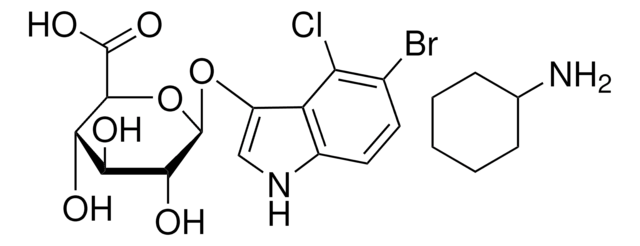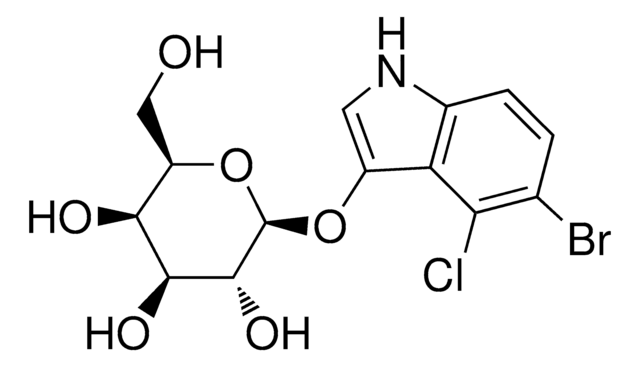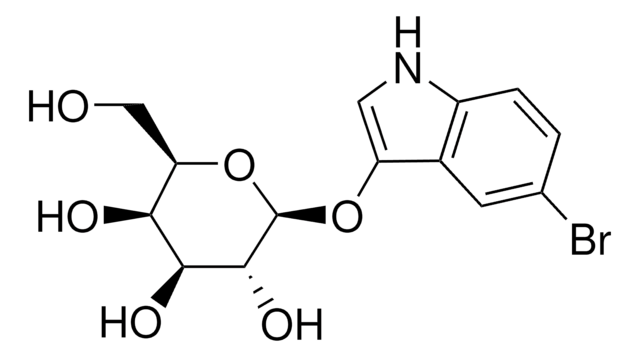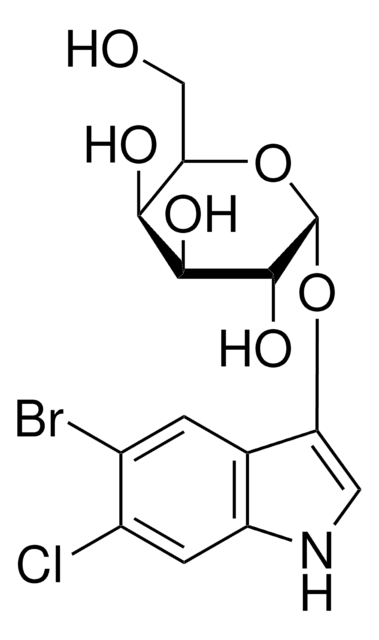B3928
Blue-White Select™ Screening Reagent
for selection of recombinant bacterial clones
Synonyme(s) :
Blue-White Reagent, Screening Reagent, Selection Reagent
About This Item
Produits recommandés
Qualité
for molecular biology
Niveau de qualité
Forme
liquid
Utilisation
sufficient for 125 dishes (90 mm)
Technique(s)
nucleic acid detection: suitable
Adéquation
suitable for nucleic acid staining
Conditions d'expédition
dry ice
Température de stockage
−20°C
Description générale
Caractéristiques et avantages
- Intense color contrast for easy colony selection
- Convenient, ready-to-use solution
Composants
40 mg/mL X-Gal
(prepared in DMSO)
Principe
The technique is based on vectors such as the pUC and the M13mp series that carry a fragment of the β-galactosidase gene encoding an a-fragment of β-galactosidase. Exploitation of these vectors requires use of a bacteria strain carrying the complementing gene fragment to allow the assembly of an active complex, resulting in the formation of blue colonies. Disruption of the ß-galactosidase gene by insertion of a DNA fragment into the vector′s multiple cloning site results in the loss of functional β-galactosidase activity; these colonies remain white, allowing for easy differentiation between lac+ and lac- colonies.
Informations légales
Produit(s) apparenté(s)
Code de la classe de stockage
10 - Combustible liquids
Classe de danger pour l'eau (WGK)
WGK 3
Point d'éclair (°F)
188.6 °F
Point d'éclair (°C)
87 °C
Équipement de protection individuelle
Eyeshields, Gloves, type ABEK (EN14387) respirator filter
Certificats d'analyse (COA)
Recherchez un Certificats d'analyse (COA) en saisissant le numéro de lot du produit. Les numéros de lot figurent sur l'étiquette du produit après les mots "Lot" ou "Batch".
Déjà en possession de ce produit ?
Retrouvez la documentation relative aux produits que vous avez récemment achetés dans la Bibliothèque de documents.
Protocoles
Blue/white color selection is a routine technique employed by molecular biologists. This technique simplifies the differentiation between colonies/plaques that contain a cloning vector without an insert and those that contain a vector harboring an insert of interest.
Notre équipe de scientifiques dispose d'une expérience dans tous les secteurs de la recherche, notamment en sciences de la vie, science des matériaux, synthèse chimique, chromatographie, analyse et dans de nombreux autres domaines..
Contacter notre Service technique





